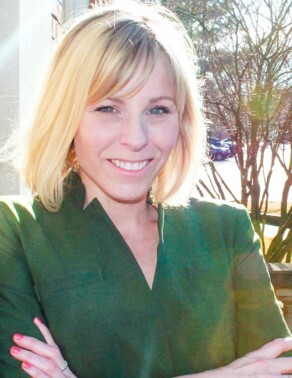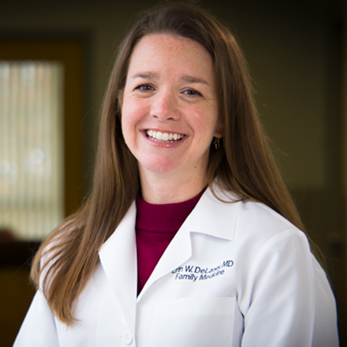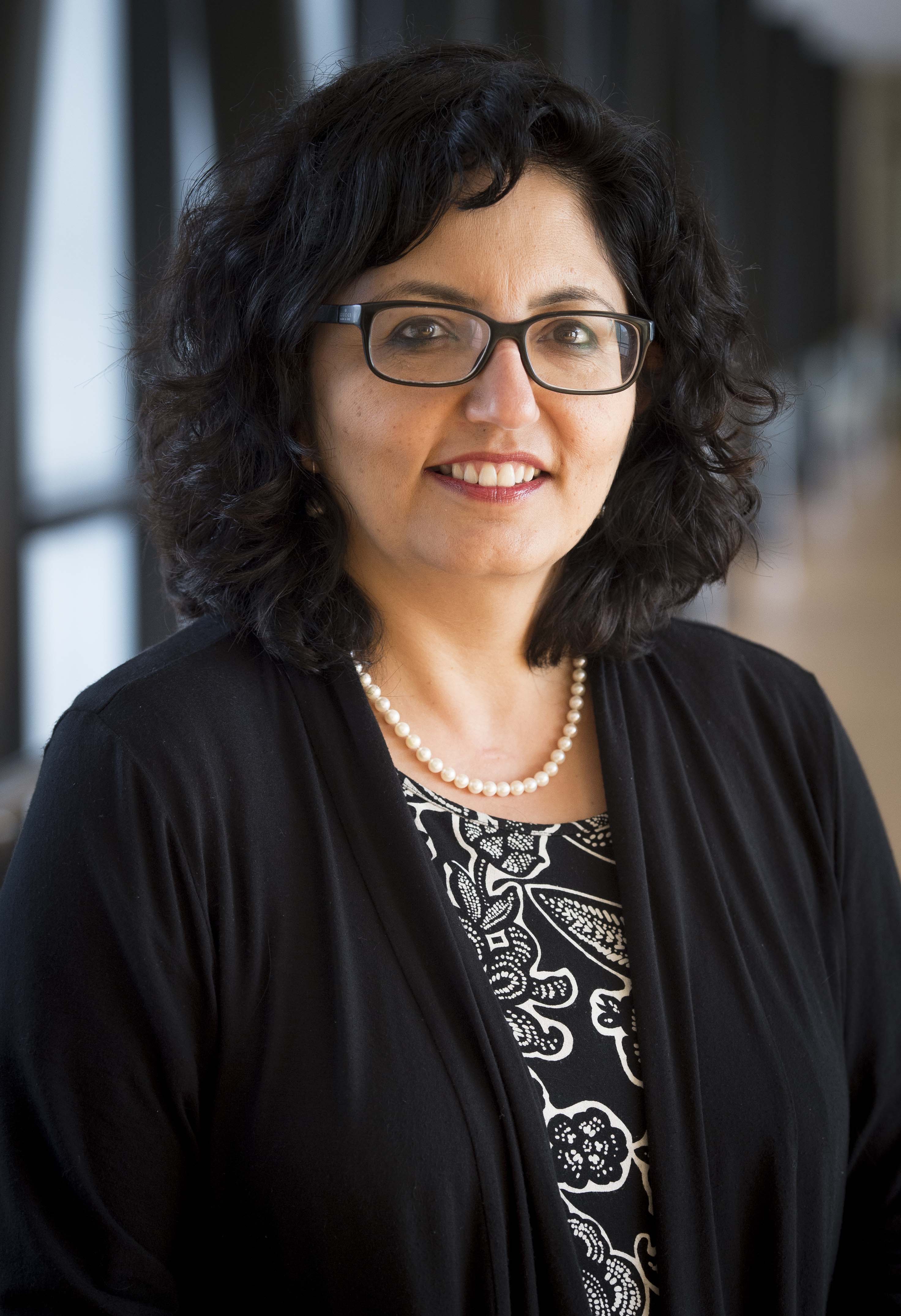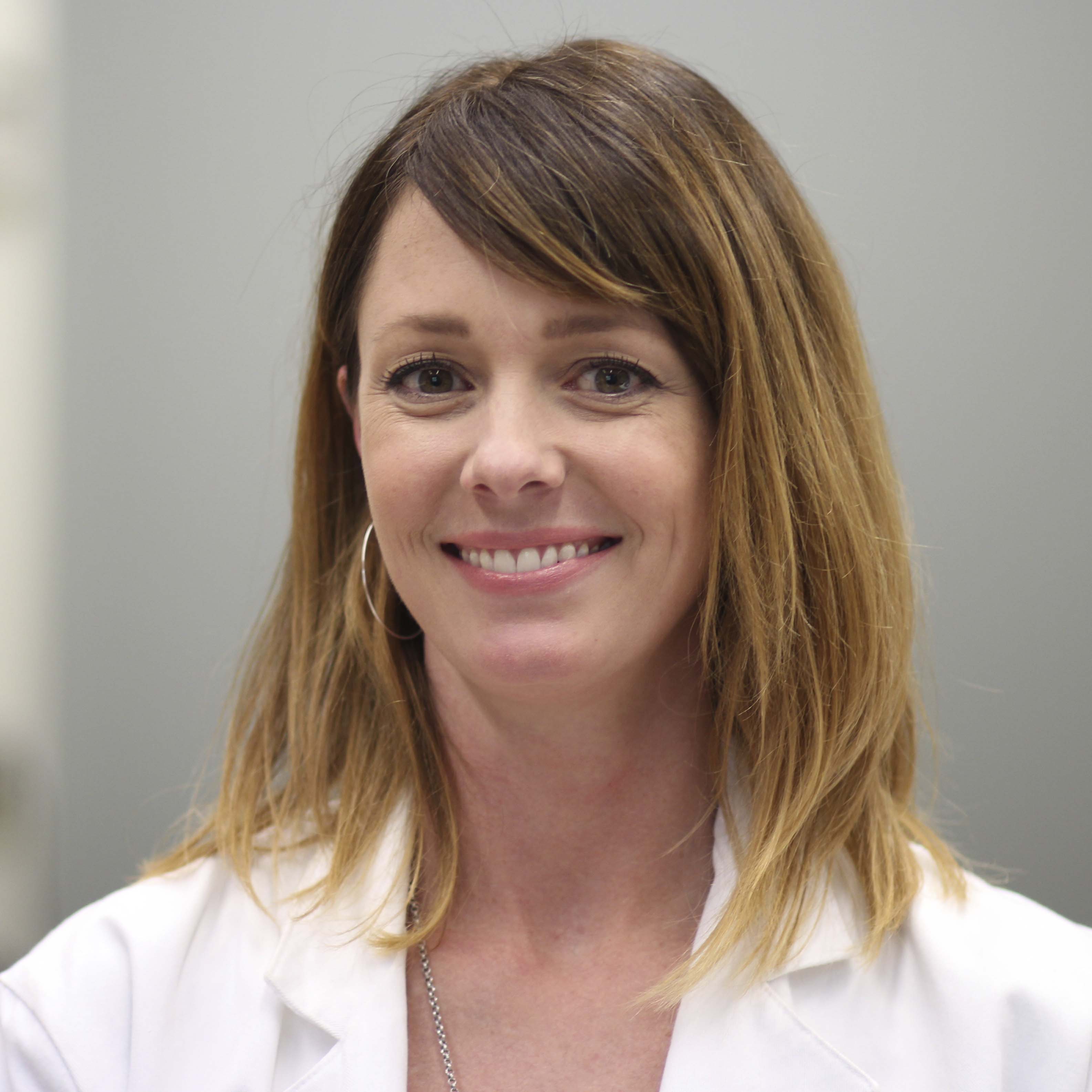 Kristina SinclairContributing authors:
Kristina SinclairContributing authors:
Jessica Martindale, Dean's Office
Erin Slay-Wilson, Family and Community Medicine
Heather Watts, Pediatrics
Jessica Jernigan, Anesthesiology and Perioperative Medicine
Women at the School of Medicine are changing the future of science, research, and clinical settings. For our Women’s History Month series, “Women Making History,” this week we showcase a few women from the mission areas of research and clinical areas.
From basic sciences and clinical trials to research program support and acquiring NIH dollars, women are making life-saving history at UAB.
The communications staff sat down with a few women making discoveries and impacting patients—from the bench to the bedside—and asked them about their own role models, what barriers they’ve faced, and advice for the next generation of women in their profession.
Kristina Sinclair, administrative director for Joint Health Sciences, Department of Microbiology, is an experienced leader and key member of the research community at UAB. She uses her administrative role as a vehicle to implement change for research, and as a platform for people to grow, adapt, and flourish.
She currently serves as administrative director of Joint Health Sciences (JHS) for the Department of Microbiology, where she specializes in leading interactions between major stakeholders and identifying and prioritizing resources for faculty and staff to help them achieve strategic goals. Additionally, she impacts the research enterprise through her partnership with the Department of Dermatology as a change agent to increase efficiencies in their research operations.
Sinclair’s overarching goal of making improvements to her workplace environment is deeply rooted within her social and professional value system, and evidenced by her background. Originally from the northwest, she began her career serving four-years in the United States Marine Corps, a portion of which was overseas and offered her a unique perspective.
Q: Who is one woman that inspired you and your career?
Nine years ago, Stephanie Meadows, then chief financial officer and assistant dean for Resource Management in the School of Medicine, and Frances E. Lund, Ph.D., the Charles H. McCauley professor and chair in the Department of Microbiology, asked me to serve as department administrator for Microbiology. I would not be where or who I am without their guidance and confidence. They are both very strong leaders and have their own styles, from which I learned that I could develop myself in a unique construct that didn’t have to fit a certain mold.
Q: What is the biggest barrier you’ve faced as a woman in your profession?
Representation. My early professional life was influenced by a very male-dominant environment, but I was lucky enough to receive coaching from some amazing male mentors along the way. However, I often wonder if my limited exposure to strong female professionals inhibited me from hitting my stride a little sooner. Seeing people who look like you, in thinking about your own path for success, really matters. It matters to our students, our trainees, our junior faculty, and the people providing mission support at this institution. Today, I look around the table and see women looking back at me. I feel that UAB has come a tremendous way in the past few decades, placing diverse candidates in vitally important roles across the institution. I am proud to work for an employer that fosters an inclusive culture because truly wonderful things start to happen.
Q: What advice would you give to the next generation of women in your profession?
Work hard. Be curious and willing to have difficult conversations. Keep fighting to make room for yourselves at the table and for your voices to be heard. Last, find the healthy balance between pitching in and delegation of your work and home life. It’s okay to ask for help.
 Erin DeLaney, M.D.Erin DeLaney, M.D., vice chair for Clinical Affairs and Quality in the Department of Family and Community Medicine, is a physician, educator, wife, mother, daughter, and friend. A family medicine physician with years of award-winning experience, DeLaney is the first woman to gain a senior leadership position with the Department of Family and Community Medicine, as well as securing a vice-chair role.
Erin DeLaney, M.D.Erin DeLaney, M.D., vice chair for Clinical Affairs and Quality in the Department of Family and Community Medicine, is a physician, educator, wife, mother, daughter, and friend. A family medicine physician with years of award-winning experience, DeLaney is the first woman to gain a senior leadership position with the Department of Family and Community Medicine, as well as securing a vice-chair role.
DeLaney is responsible for managing the day-to-day operations of all family medicine clinics at UAB and for pursuing practice transformation research and implementation to improve patient care and outcomes. A pioneer in the department, DeLaney says, “My role as a clinical leader is to help our team expand the reaches of high quality primary care. That means looking at ways to improve access to patients and how we can deliver on things that really matter in the long run when it comes to one’s health. We also have to constantly ask the questions of how can we make things better both for our patients and providers.”
On her role as an educational leader, she says her goal “is to help come up with and propagate new ways to counsel and educate patients in order to prevent and treat disease. In terms of student learners—undergraduate students, medical students, residents, fellows—I facilitate learning opportunities, as well as try to impart the importance of good primary care.”
Q: Who is one woman that inspired you and your career?
My mother has always been a role model to me and my biggest supporter, especially as I started on my path to a career in medicine. My mom is the hardest working person I know, and will always see a project through to its completion, no matter what. She taught me perseverance in difficult times and to not give up, a valuable lesson in medicine. And, while at the same time as teaching me to persevere and work hard, she also taught me how to give myself grace—that as long as I am doing the best I can do, that’s all that matters.
Q: What is the biggest barrier you’ve faced as a woman in your profession?
I don’t feel like I have encountered true barriers, but rather uncomfortable or difficult situations that I have been able to overcome. When filling roles that have traditionally been held by males or working in environments that are predominantly male, I have previously felt the need to prove myself, to show that I could add a presumed equal value. What I have come to focus on, though, is that we all add value to our teams and positions regardless of gender, and also perhaps because of gender, by bringing unique perspectives, opinions, and experiences to the table. The difficulty I face on a more daily basis, however, is balancing being a parent and being a physician. I think the best approach to this, and what I continue to work on, is figuring out what this means and looks like for me, as it will be different for everyone, and then finding ways to make it happen.
Q: What advice would you give to the next generation of women in your profession?
Work hard, remember why you went into medicine, know your priorities, and don’t be afraid to be yourself or to speak up.
 Smita Bhatia, M.D., MPHSmita Bhatia, M.D., MPH, professor and vice-chair for Outcomes in the Department of Pediatrics and director of the Institute for Cancer Outcomes and Survivorship in the UAB School of Medicine, joined UAB in 2015 and established the Institute for Cancer Outcomes and Survivorship. Bhatia has over 340 peer-reviewed publications, 24,294 citations, an H-INDEX of 85, and is an internationally renowned leader in cancer survivorship and outcomes research.
Smita Bhatia, M.D., MPHSmita Bhatia, M.D., MPH, professor and vice-chair for Outcomes in the Department of Pediatrics and director of the Institute for Cancer Outcomes and Survivorship in the UAB School of Medicine, joined UAB in 2015 and established the Institute for Cancer Outcomes and Survivorship. Bhatia has over 340 peer-reviewed publications, 24,294 citations, an H-INDEX of 85, and is an internationally renowned leader in cancer survivorship and outcomes research.
She has been continually funded by the National Institutes for Health (NIH) since 2000 and has received many prestigious awards for her research efforts including the Outstanding Investigator Award from the National Cancer Institute. In addition to her many accomplishments as a researcher and clinician, Bhatia is also passionate about mentoring the next generation of investigators. In recognition of her mentoring efforts, she was the recipient of the Dean’s Excellence Award for Mentoring in 2020.
Q: Who is one woman that inspired you and your career?
My mother. She was a high school teacher and managed to raise three strong girls, while managing a full-time job, which largely fell upon her as my father’s job involved a lot of travel. In an era of no TV, no telephone, and no computers, she was essentially my mentor and best friend, and continues to be so even today. Her wisdom amazes me.
Q: What is the biggest barrier you’ve faced as a woman in your profession?
The barrier was doubled by the fact that I was a woman and a first-generation immigrant, so there was the need to work really hard to prove that I could do more than just take care of children with pneumonia and diarrhea. Being a mother to two young children when trying to write the first grant and the first paper, and not having female role models at work was tough.
Q: What advice would you give to the next generation of women in your profession?
Do not be defensive about the need to balance your life outside of work. And use your time very efficiently—you still have a lot to prove.
 Jennifer DeBerry, Ph.D.Jennifer DeBerry, Ph.D., assistant professor in the Department of Anesthesiology and Perioperative Medicine, received her doctorate in behavioral sciences at UAB and completed her fellowship training at the University of Pittsburgh Center for Pain Research. Her research applies a multipronged approach to understanding mechanisms that lead to pathological changes in sensation, namely pain. She is most interested in visceral sensation, which has several unique qualities. It is largely problematic from a clinical perspective, and is less understood than somatic sensation.
Jennifer DeBerry, Ph.D.Jennifer DeBerry, Ph.D., assistant professor in the Department of Anesthesiology and Perioperative Medicine, received her doctorate in behavioral sciences at UAB and completed her fellowship training at the University of Pittsburgh Center for Pain Research. Her research applies a multipronged approach to understanding mechanisms that lead to pathological changes in sensation, namely pain. She is most interested in visceral sensation, which has several unique qualities. It is largely problematic from a clinical perspective, and is less understood than somatic sensation.
DeBerry's lab utilizes an integrative approach to examine the function and phenotype of sensory neurons, spinal and supraspinal sensory processing, and descending modulation of sensory information in animal models of inflammation, neuropathic injury, and stress.
In addition to conducting research and mentoring research trainees, DeBerry gives a number of lectures each year to postgraduate students and fellows and is part of the leadership team for the recently established Center for Addiction and Pain Prevention and Intervention. In sum, the goal of these activities is to contribute something meaningful toward decreasing the burden of pain and pain-related suffering.
Q: Who is one woman that inspired you and your career?
During my postdoctoral training at the University of Pittsburgh, I was part of a lab with an interest in how growth factors regulate the development and function of the sensory nervous system. It was during this time that I learned that I am separated by five degrees in my academic genealogy from Rita Levi-Montalcini, an Italian Senator for Life and Nobel laureate honored for her work in neurobiology and discovery of nerve growth factor. Dr. Levi-Montalcini was a holocaust survivor who was barred from an academic career, and during the Nazi occupation she set up a home laboratory while in hiding where the foundation of her most important research was laid. Ultimately, she was recognized far and wide for her invaluable contributions to neurobiology and medicine. She died at the age of 103 having never married and without children. There is a quote by Levi-Montalcini that serves as a reminder to keep steadfastly focused on one’s goal despite adversity: “I should thank Mussolini for having declared me to be of an inferior race. This led me to the joy of working, not any more unfortunately in university institutes, but in a bedroom.”
Q: What is the biggest barrier you’ve faced as a woman in your profession?
I think the biggest barrier I’ve faced is learning what it means to be balanced–and in fact, that work-life balance is a misnomer. This learning is an ongoing process. In addition to being a scientist, I am a mother and a daughter. It’s exceptionally important to me to be present for and take care of my people in the ways that serve them best.
Q: What advice would you give to the next generation of women in your profession?
Figure out what keeps you excited and motivated. Find those people who support you and let them be your allies. Turn the Matilda Effect on its head.
Read Part 1 of our series, "Celebrating the women who have come before us" and Part 2, "Women Making History" in teaching and education. Our final installment will feature women in the areas of Administration, Outreach, and Diversity.
